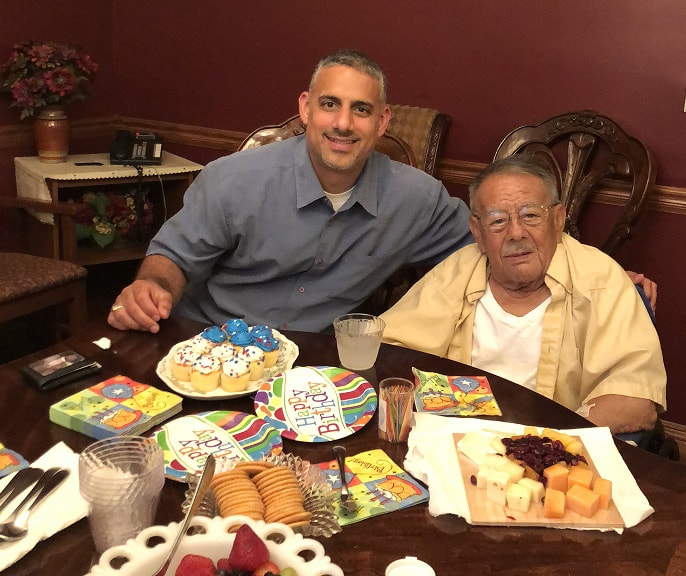There are times when a nursing-home volunteer reaches the limits of her ability to be a blessing to residents. When that happens, it’s time to call in the experts.
Care-age of Brookfield resident Ernesto Aguilar is a case in point. He has been a regular attendee at our weekly Bible Discussion for many months – an active participant who probably knows his Bible better than just about anyone in the group (although he would deny it). And in visiting with him outside of this group, I’ve also come to know that he is one of the sweetest people I’ve ever met.
Just one problem: English is not Ernesto’s native language. Spanish is. And it can be a little challenging at times to carry on a conversation, because this native of Mexico is very soft-spoken, has a moderate accent and can’t always think of the English words for what he is trying to express. (Please don’t misunderstand. As someone who had literally years of French and German instruction and can speak almost nothing in either language, I am properly blown away by Ernesto’s command of English. But it does sometimes fail him, especially when we’re discussing something deep, like theology.)
Ernesto thoroughly enjoys conversing with others. But these talks can be hard on him. There’s the frustration of being unable to come up with precisely the words he’s looking for, and of speaking with someone who hasn’t a clue what the Spanish means. And there’s the hard work involved with translating, on the fly, word upon word, phrase upon phrase; surely these conversations are exhausting for him!
But one day, the Lord presented me with the solution: During a blood drive at Brookside Baptist Church in Brookfield, Wis., He sat me next to Joaquin Peña, the young Outreach and Hispanic Ministries pastor. I learned that Joaquin is originally from the Dominican Republic. And then, as the technicians were draining the lifeblood out of me, I had one of those lovely Eureka! moments: Perhaps this pastor would be willing to visit with Ernesto.
The question wasn’t even completely out of my mouth before Joaquin said “Of course!” And within days, he and Ernesto were engaged in lively conversation in the private dining room at Care-age. (People who accuse women of chattering the hours away should spend a little time listening to men speaking in Spanish. These fellows talked for two solid hours without a single pause except to engage in some hearty laughter.)
I don’t know what they talked about, other than hearing the name “Cristo” repeatedly and some occasional references to “King James” and “New American Standard.” But I do know they both had a great time, and are looking forward to a repeat visit next week.
The lesson for us uni-lingual volunteers?
By all means, try to learn at least a few words of the languages of residents who count English as a second or third tongue. In recent years, we’ve had occasion at Care-age to attempt not only Spanish, but also German, Latvian and Serbian. If it doesn’t delight the residents at hand, at least it usually gives them a good laugh to hear us mangle the words and phrases that are so familiar to them.
But unless you’re fluent, try to find someone locally who speaks the resident’s native language, and would have time for a nice visit. Nearby churches are probably the best place to start. Or you could try local universities or community centers serving specific ethnic groups. Either way, be sure to speak with your facility’s Activities Director about your idea, not only for possible leads but also to make sure you follow all the rules about bringing outsiders in to visit.
I guarantee that it will be worth the effort. Such visits will give your favorite residents the opportunity to relax and converse freely about any subjects that interest them, without the intense mental labor of non-stop translation.
I guarantee, too, that it will fill your heart with joy to listen. Even if you don’t understand a word they saying.

 RSS Feed
RSS Feed